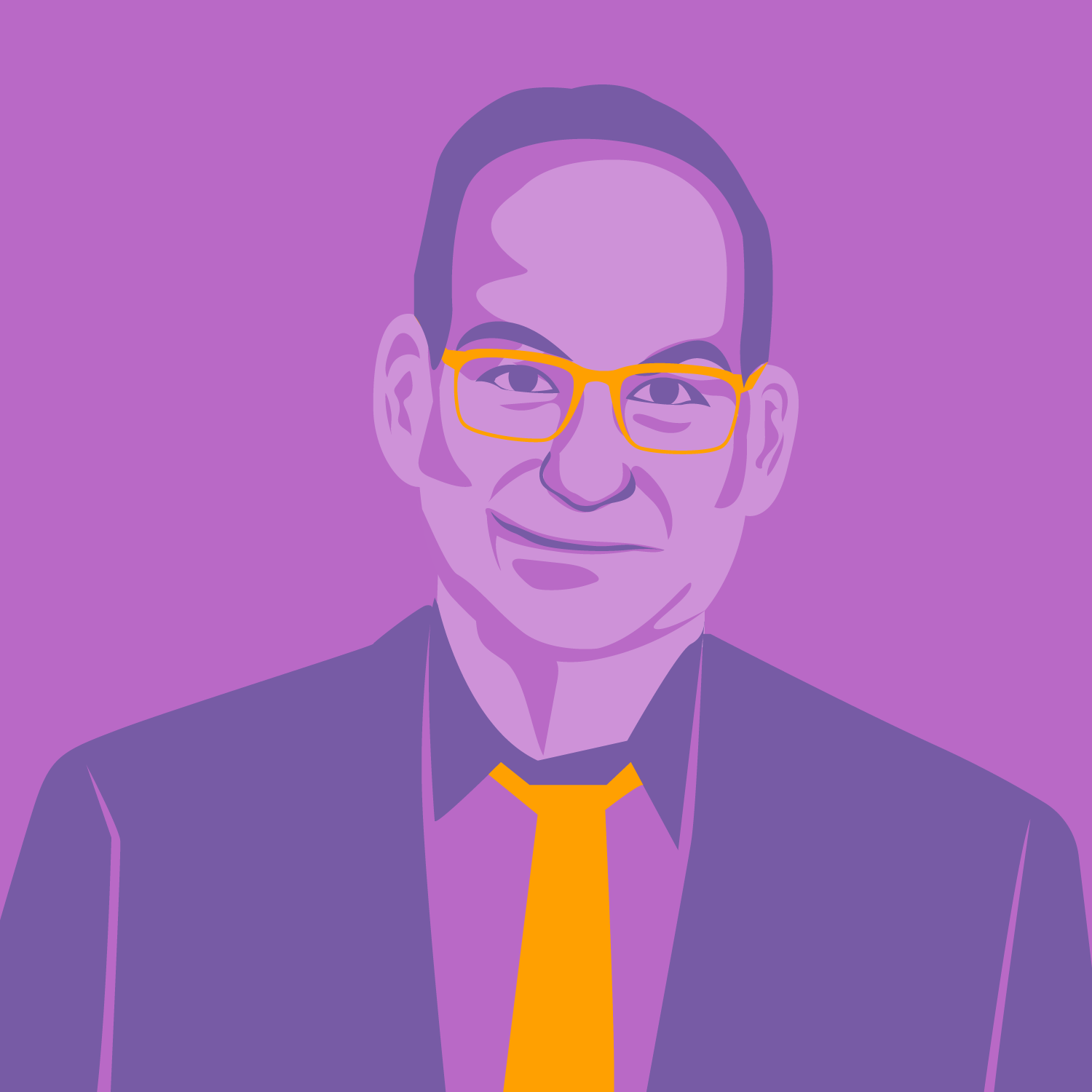NARRATOR: “We hold these truths to be self-evident, that all men are created equal, that they are endowed by their Creator with certain unalienable Rights, that among these are Life, Liberty and the pursuit of Happiness. That to secure these rights, Governments are instituted among men, deriving their just powers from the consent of the governed.”
These words from the Declaration of Independence underscore the commitment of the Founding Fathers to liberty and equality. In fact, the Founding Fathers concluded it was necessary to break with an English government that did not sufficiently protect inalienable rights. We turn to the difficult question of how these same Founders could tolerate the institution of slavery on their own shores.
We feature three distinguished speakers:
Randy Barnett. the Carmack Waterhouse Professor of Legal Theory at the Georgetown University Law Center.
John Harrison, the James Madison Distinguished Professor of Law at the University of Virginia School of Law.
Lucas Morel, Head of the Politics Department at Washington and Lee University.
Join us today as we explore the Founding Era - the ideas, the documents, and the people who shaped the United States of America.
PUBLIUS: Professor Morel, did the Founders consider slavery at all when they were drafting the Declaration of Independence?
LUCAS MOREL: There was no one remotely involved with the writing or editing of the Declaration of Independence, the second continental Congress. In fact, there was hardly nobody in civil society in the States or the colonies at that time that didn't consider slavery a controversial thing. It was not unremarkable. It was remarkable. It was a remarkable in the sense that slavery stood out.
The founders did not believe in the 1770s that they could both free themselves and free their slaves at the same time. They thought that the priority would be separation from mother England, if you will. We're grown up now. We don't need your help. We'll mind ourselves. Thank you very much. They did not think that they could do both things at the same time.
So the Declaration of Independence, if you will, stands as our first emancipation proclamation, but it didn't proclaim freedom for all Americans. The founders, in fact the most famous of them, Madison, Jefferson, Washington, they all own slaves and it was only Washington who freed his slaves to any significant extent in his will. Jefferson, I think freed, I think about five or so. Even someone who was instrumental to forming the Constitution like Madison did not free his slaves. They thought that the most important thing was to set up the institutions of government upon principles that would ineluctably over time by the consent of the governed lead to the general emancipation for all down the road.
It might be understood by some as kicking the can to the next generation. It was certainly understood by Jefferson that way. He wrote famously in his notes on the state of Virginia in 1785 that, "I tremble when I fear that God is just, that is just as shall not sleep forever." What did he mean by that? He thought, unless the white slave holders of Virginia figured out a way to emancipate their enslaved blacks, that God might intervene. Supernatural interference, if you will. This is Jefferson's phrasing. He said that if it became a contest between the enslaved rising up to seize the freedom that naturally belonged to them, no less than no more than it belonged to Jefferson. He did not believe God would take the side of the white majority. And he said, "How about we avoid that race war? How about we avoid all that blood being spilled by trying to figure out a peaceful way, a rule of law way to get rid of this institution."
When he speaks of justice, who is he speaking to? Who is he speaking of? Not the white slaveholders. He's speaking about the enslaved. He is saying even on his own slaves, that if they were to rise up to secure their own rights, they would be in the right. He would consider this in the eyes of God, their sacred rights. In fact, that's how we refer to it in a paragraph that he wrote that was deleted from the Declaration of Independence. It was a paragraph condemning King George III for continuing the slave trade. In that paragraph, Jefferson says categorically that slaves not just have rights, they have sacred rights. And when you say that they're sacred, it's in the eyes of whom? Not in the eyes of a human being. It's in the eyes of that human beings' creator, God. In the eyes of God even Jefferson said, "Oh, yeah. All humanity, including the enslaved African on American soil. Even he, even she has rights."
PUBLIUS: Professor Harrison, how did the Founders reconcile slavery with their claims for equality and unalienable rights?
JOHN HARRISON: One of the great paradoxes about American enlightened human thinking, in particular what back in those days more than today would be called American Whig thinking, that is, emphasizing their continuity with those who opposed the Stuart monarchs... One of the great difficulties is that they routinely complained that the British government was trying to reduce them to slavery. And yet, many of them held slaves.
So their opposition to arbitrary power, their formulation of their position as being one who are held as slaves, was of course deeply ironic in the sense that many of them, and I want to stress, many of them, by no means all of the Framers of course were slave-holders and a substantial number of them had strong and principled opposition to slavery and it's easy to forget about that when we focus on the fact that yes, many of them and some of the very influential leaders were indeed slave-holders, a lot of them were not. But for those who were slave-holders or for those who were prepared to participate in a constitutional system along with slave-holders, the fact that the very thing they objected to, that is, untrammeled authority, being able to do whatever you want, and again, their favorite word for that was "arbitrary", well, that's the kind of power an owner has and that's the kind of power that a slave-owner has.
But, if you put that deep irony to one side and think without that difficulty about the nature of the claims that the Americans were making, those are indeed precisely the claims of equality, that is to say, rejecting natural hierarchy, rejecting natural subordination of one person to another, because it's that natural subordination that creates what they characterized as tyranny, what they characterized as slavery, what they characterized as arbitrary power. So for them, there was a strong connection between the universal moral equality of human beings and the view that no one, no king, no emperor, no magnate, was allowed to exercise arbitrary power. And that connection, of course, produced a very serious problem for them in that a lot of them held just that kind of arbitrary power.
Given that so many Americans at the time of the Revolution, the time of the Framing, certainly in some sense believed what the Declaration of Independence says, that all men are created equal, that they have inalienable rights and so forth, how was it possible for those who believed that that principle was incompatible with some of the things they were doing, specifically slavery, to allow all those things to happen for so long? What's the source of divergence between people's principles and people's actions?
One answer is, people are strongly influenced by their material interests. That's not news to anybody, it's not news to any student of politics in general, it's not new to any student of American politics and in particular the history of the American Constitution. The larger sacrifice in terms of material interests that's called for from people by their principles, the slower is going to be the process of their coming to actually implement their principles, or sometimes it has been known to happen that they would change their principles in line with their material interest. So this is one of those questions on which, what about the disjuncture between the moral ideals stated in the Declaration of Independence and the practice of the United States, in which I think it's necessary to be realistic about human beings, and realize that what they actually do routinely does not live up to what they say is right.
PUBLIUS: Professor Barnett, how conscious were the Founders about this gap between their rhetoric and their actions?
RANDY BARNETT: In a way, slavery was not that controversial at the time of the founding because there was an intellectual consensus that slavery was wrong and unjust. It's hard to remember that there was such an intellectual consensus because of the debates over slavery that arose later. At the time of the Declaration, slavery was universally understood to be wrong and unjust. Now, it was an existing institution. It could not be done away with right away, partly because of the economic investments that some people had in it, and they weren't prepared to give up the wealth that was within their slaves, and the way that their economy was organized. Pretty much everyone conceded that it was wrong, and then the only question is what to do about it.
When it comes to slavery, the Declaration gives you a almost definitive argument against slavery. All men are created equal, endowed with inalienable rights. Not only would that be true of us today, but they knew that that was true then. By committing themselves to those words, they were committing themselves to the eventual end of slavery. This was well-known. They thought slavery would gradually die out because they thought it was an economically dying institution.
One more thing I'll say. Since they anticipated that slavery would eventually go away, they wanted a Constitution that wasn't marred by the reference to slavery in the future. The absence of any reference to slavery was deliberate. During the Constitutional Convention, when proposals were made that would seemingly have endorsed slavery, and then it was pointed out that wait a second, by saying this, it looks like that could be construed as an endorsement, they immediately voted that out. None of that language made it into the Constitution.
PUBLIUS: We’ll talk more about the Constitution in the next episode. Does the Declaration of Independence still deserve our reverence or is it marred by the failure of the Founders to fully deliver its promises to everyone? Professor Morel, what are your closing thoughts on this?
LUCAS MOREL: Yeah, it is the fundamental tension of American social and political history. People echoing the statement of Samuel Johnson, "How is it that we hear the greatest yelps for liberty from the drivers of Negroes, the drivers of slaves." He founded a contradiction. How could we be claiming that our rights are being infringed while we turned around and infringed rights? The founders were profoundly aware of this and in fact unsettled by it, but it wasn't something they thought they could do anything about. At least not on a mass scale. Individual slave owners did free their slaves, but they were a minority, no doubt. But, it was the tension that they were aware of and the question is really a question of prudence. If you can't do everything at once, does that mean you shouldn't even make the attempt? People are shocked and surprised that the founders claimed human rights on the one hand, but enslaved people on the other. I think a different way to look at it is, isn't it more surprising that slaveholders would decide to make human rights the basis of their independence and liberty?
That for me is the pivotal step, the pivotal moment, in my opinion, the founding moment in the United States is when we, unlike all the other slave owning societies in the world that practice the same institution. Unlike them, we slaveholders, if you will, serious we there, we slaveholders decided, "You know what? We want to create a society where slavery isn't the predominant principle." But freedom, the rights that people have by nature. We are going to establish our society on those principles, on those self-evident truths, on those grounds, the laws of nature and nature's God as Jefferson put it.
It's not the existence of slavery that makes you the United States unique. That's not the driver of our history. The driver of our history is slaveholders recognizing that their practice is wrong. Finding impediments, we can debate those impediments but finding impediments and obstacles to mass immediate emancipation for fear of race wars, the principal reason, finding those impediments in the way, but pledging themselves on paper to a society that should be a society based on consent. A society based on the equal rights of humanity.
For me, that is the most startling, the most world changing decision and action of the founders. It was an action that wasn't perfect. It wasn't categorical, it wasn't something they could implement right away. Abraham Lincoln said, "They had no power to confer such a boon." They declared the right, hoping that the enforcement would follow as fast as circumstances shall permit.
PUBLIUS: A country founded on freedom and equality was something entirely new and revolutionary at the time of the drafting of the Declaration of Independence. How did these principles shape the actions of the Founders themselves in their personal and political lives? In the next episode, we’ll discuss some of the individual Founders and how they were affected not only by the ideas of the time but also the historical circumstances of their generation.
NARRATOR: Thank you for listening to this conversion from the No 86 Audio Series. The spirit of debate animating the Federalist Papers in the Founding Era inspires all of the No. 86 content, encouraging discussion and critical reflection relative to how each subject is widely understood and taught in law schools and among law students.
Subscribe to the No. 86 Lecture series on your favorite podcast platform to have each episode delivered the moment it’s released. You can also go to fedsoc.org/no86 for lectures and videos on Federalism, Separation of Powers, the Judiciary and more. Thanks for listening. See you in class!









